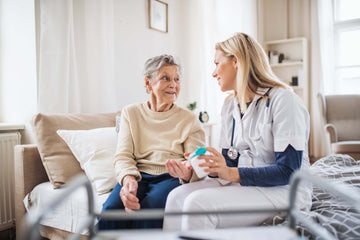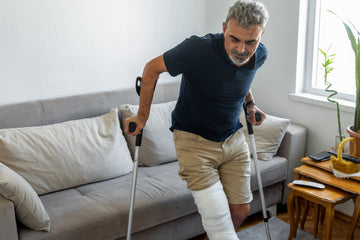There’s something no doctor’s note, discharge form, or rehab schedule ever really prepares you for — the emotional weight of recovery.
Whether you're healing from surgery, managing a chronic condition, or simply adjusting to the new reality after a fall or illness, it’s not just the body that’s on the mend. It's the mind and spirit too.
Recovery can be isolating. Frustrating. Even a little scary at times. Days stretch out. Movement may be limited. And those once-simple routines — getting up from a chair, brushing your hair, walking across the room — can suddenly feel like marathons.
And yet, amidst all this, small comforts can become the unsung heroes of healing.
They’re not just about physical ease — they’re the little things that whisper: you’re safe, you’re supported, and you’re not alone in this.
Let’s take a deeper, more human look at the emotional side of recovery — and the quiet power of comfort in helping people feel more whole again.
Why Recovery Feels So Personal — and So Emotional
When your mobility is limited or your daily routine is disrupted, it can feel like your sense of independence is slipping through your fingers. Add pain, fatigue, or sleepless nights into the mix, and it’s easy to see why emotions run high during recovery.
And for many people — especially older adults or those healing at home — there’s a loss of control. Control over their space, their movement, their schedule, and even their privacy.
Recovery can also stir up unexpected emotions:
Grief for how things used to be
Anxiety about the future
Frustration at being dependent on others
Loneliness from staying in more or being less social
That’s why creating an environment that feels gentle, empowering, and emotionally soothing is just as important as physical therapy.
The Role of Comfort in Emotional Recovery
Comfort, in this sense, goes beyond cozy blankets and soft pillows. It’s about creating moments of relief, familiarity, and dignity — even in the middle of discomfort.
Here are a few ways comfort supports emotional well-being:
🛋️ Familiar Spaces, Thoughtfully Arranged
Being surrounded by comforting things — a favorite chair, a familiar scent, a well-placed cushion — can reduce anxiety and create a sense of normalcy. Even having a few soft touches in a room that smells nice and feels warm can help someone feel “at home” in their own space again.
🧠 Less Strain, More Sanity
When someone doesn’t have to struggle to get up, reach a remote, or bend over, it reduces mental fatigue. Comfort tools like lumbar pillows or simple support braces help reduce the mental and emotional toll of “pushing through.”
🌿 Sensory Support
Soothing sounds, calming lights, and natural scents have been shown to support emotional regulation. Aromatherapy essential oil diffusers, for example, can transform a cold recovery space into a calm sanctuary with just a few drops of lavender or eucalyptus.
Small, sensory comforts remind us that we’re still whole people — not just patients.
Two Small Comforts That Make a Big Difference
There are many tools that support recovery, but here are two simple items that stand out for their emotional benefits:
💨 Air Compression Leg Massager
This device is more than just a treat for sore calves. It gently simulates circulation, reduces swelling, and helps alleviate that “heavy legs” feeling that can weigh down both body and mood.
For someone who’s been off their feet or sitting for long periods, this kind of targeted pressure can bring real relief — both physical and emotional. It mimics the care of a gentle massage, which can be deeply reassuring.
🌬️ Ultrasonic Essential Oil Diffuser Set
This is one of the easiest ways to bring peace to a space without changing a single piece of furniture. The soft mist, ambient light, and customizable oils give people the chance to personalize their surroundings — a small but powerful act of self-agency during a time when so much feels out of their control.
Lavender for sleep. Citrus for energy. Eucalyptus for clarity. The benefits go beyond smell — it’s about creating mood environments that support healing on a deeper level.
Supporting Recovery with Heart: A Caregiver's Perspective
If you're a caregiver — whether you're a daughter, spouse, friend, or nurse — you're likely doing your best to manage logistics. But don’t overlook the emotional weight your loved one may be carrying.
Sometimes what helps most isn’t big gestures, but small comforts:
Putting a soft pillow behind their back while they rest
Turning on calming music in the afternoon
Offering a warm blanket when they feel chilly — even in summer
Making sure their favorite tea is close by
These gestures say: I see you. I care about how you feel, not just how you heal.
A Gentle Reminder
Recovery is not a race. It’s not always linear. Some days feel strong. Others don’t.
But in between the pain management and physical therapy, there’s space for gentleness. There’s room for little comforts that lift the spirit and make the day just a bit easier.
Whether it’s a warm compress, a softly glowing diffuser, or a quiet moment of breath and stillness, these small things remind us that healing is also about feeling — and those feelings deserve care, too.
Final Thoughts: Comfort is Care
It’s easy to focus on what recovery takes from us — time, energy, independence. But comfort helps give something back: peace, control, calm.
As you or your loved one walks this road, remember that emotional wellness matters just as much as physical recovery. And often, it’s the smallest things — the quiet comforts — that leave the biggest mark.
Because when it comes to healing, how you feel matters.









